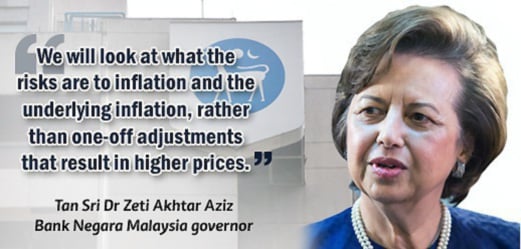All eyes on next rate hike
 Bank Negara Malaysia is not going to “run the economy to the ground” to achieve low inflation, said governor Tan Sri Dr Zeti Akhtar Aziz.
Bank Negara Malaysia is not going to “run the economy to the ground” to achieve low inflation, said governor Tan Sri Dr Zeti Akhtar Aziz.
Risks to growth have to be taken into account, too, she said, cautioning that any significant brakes will be the cause for some pausing in the further raising of interest rates in the near term.
After the 25 basis points hike in July, the market is expecting another 25 basis points hike, either on September 18 or during the last scheduled meeting for the monetary policy committee for the year on November 6.
Zeti, in an interview with Bloomberg on the sidelines of the Global Islamic Finance Forum, explained the various factors needed before the central bank decides to continue with the hiking cycle.
“We will look at what the risks are to inflation and the underlying inflation, rather than one-off adjustments that result in higher prices.
“Obviously, we’re not going to run the economy to the ground to achieve low inflation, we look at the risks to growth as well.”
Another factor taken into account is the build-up of financial imbalances.
On the inflation outlook , Zeti said the consumer price index will increase during the transit period this year and next year due to price adjustments, especially the Goods and Services Tax, but added that it would be temporary.
Malaysia scored the highest in terms of inflation in the latest World Competitiveness Report by the World Economic Forum due to its low growth rate.
“Right now, we put the inflation at between three and four per cent, and there could be months when it could rise above four per cent but on the average for the year, we expect it to be in that region, for this year and also going into next year.
“In 2016, we expect it to stabilise in the region of three per cent and it is because consumption
growth is stabilising at a slightly
slower level than the long-term average.”
Zeti is also confident that investment activities would still continue, saying there is little concern about the second-round effects since wage growth is also moderating.
“We are not seeing excess demand and we are not seeing wage pressures.”
On whether there is need to be pre-emptive on rates as inflation quickens, she said:
“It depends. It’s not just looking at a single number. We look at hundreds of indicators to assess the performance of the economy and to assess the outlook for inflation.”
Second-round effects have to be carefully monitored in deciding the interest rate policy.
“In any case, the actions that we have already taken are part of a normalisation because the interest rate that is currently prevailing is very supportive of growth.”
The monetary policy will continue to refer to normalisation of the interest rate when it does not have a dampening effect on growth, she added.
“This is adjusting the degree of accommodation, so that it will not promote financial imbalances.”
On her assessment of whether the current risks are tilted more towards growth or inflation, she said: “We cannot rule out that risks could materialise, that growth would slow down more than what we anticipate, in which case it would not prompt any further rate adjustments.
“It’s only if growth is still relatively positive. If the growth outlook is relatively positive and strong, then this provides the window of opportunity for rate adjustments.”
On the performance of the ringgit, Zeti expects the currency to reflect the underlying fundamentals over the medium term.
There could be occasions where the currency would move against the underlying fundamentals, but the role of the central bank would be just to maintain orderly conditions.
However, currencies do not always reflect the fundamentals from day to day, she warned.
“It may temporarily be affected by financial flows and these financial flows are often triggered by events that unsettle the markets. Therefore, we are not immune to the effects of those developments,” she added.
Source: News Straits Times


BNM should increase the rates to curb the soaring house prices and more importantly, to get our industries to move up the value added chain and away from the reliance of cheap imported labour.
“…BNM should increase the rates…..more importantly, to get our industries to move up the value added chain….”???
Increase rates for industries to move up the value added chain? You must be an idiot!
A stronger ringgit policy will go some way to doing just that.
looking forward to the next rate hike … hopefully a 0.5 % rate increase
@Father
unless you have plenty of cash in FD and zero investment. stock, property, business etc. not going to go down well with the hike my fren…